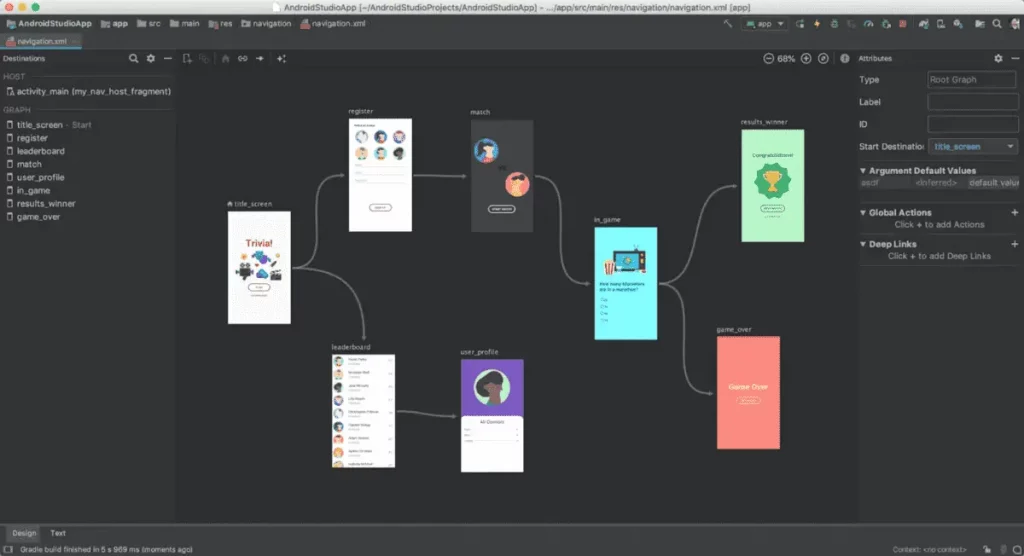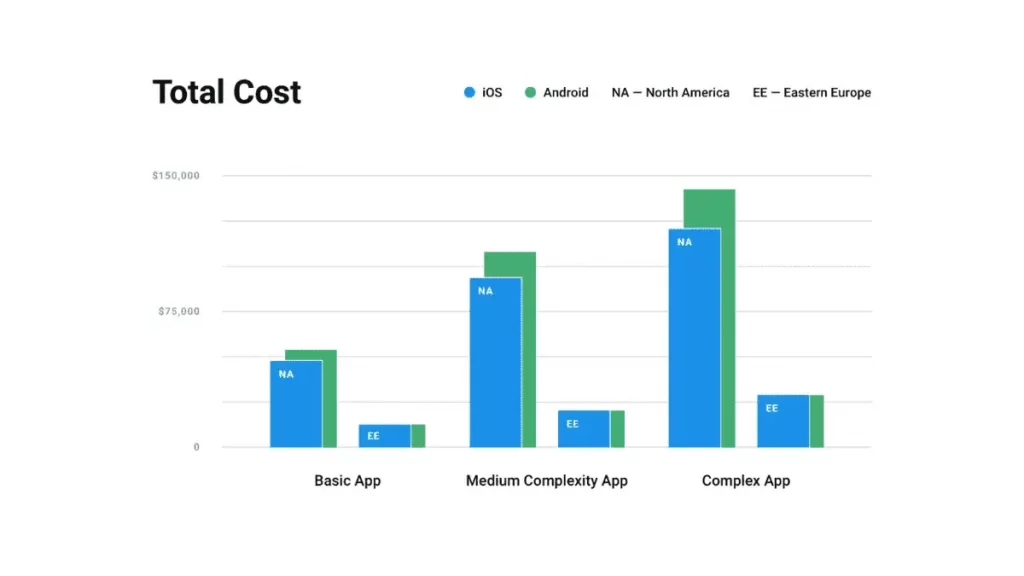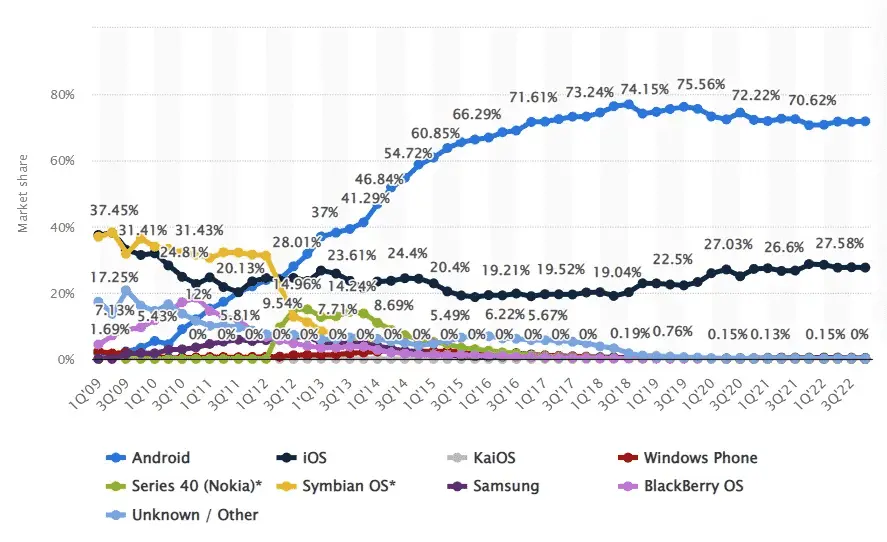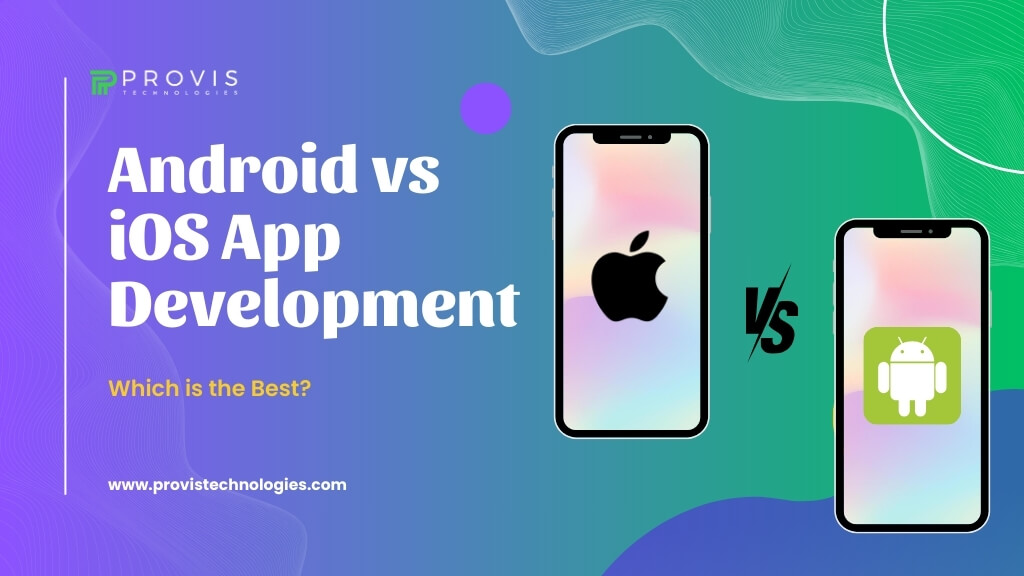Let’s start with some facts & figures. Do you know that Android covers 70.7% of the total market share? While Apple holds 28.5% only – figures from Statista for 2024’s first quarter. Clearly, Android rules the market in terms of user strength. You will be surprised to know that Android, however, has the majority of the market – Apple users spend way more than Android users on apps and in-app purchases. The difference is significant enough to make it a tough choice between Android vs. iOS app development. So, if you are looking for app development and are confused between Android app development & iOS app development – this blog post will help.
Android App Development vs iOS App Development
There are some significant differences between the duo – so let’s start with the primary distinctions:
Programming languages
To develop any app, you need programming languages, so let’s talk about them first.
iOS
Objective-C & Swift – are the two popular apps developers use for iOS app development. Swift is known for its speed, advanced features, and excellent performance. It makes iOS app development easy & fun. Objective-C is the iOS ecosystem’s first programming language. That’s the reason it has a robust community & infrastructure. However, due to its complex structure, Objective-C demands some level of expertise for iOS app development.
Read More: Color Palette Generators for Website
Android
Java & Kotlin – these are the core Android app development programming languages. Java is known for its stability & security. Whereas Kotlin is kind of a more advanced version of Java and runs on the JVM (Java Virtual Machine) only. Kotlin has fixed the drawbacks of Java to become a popular language. Today, most developers prefer Kotlin for Android app development due to its benefits & syntax conciseness.

Development Environment
An IDE (Integrated Development Environment) has a source code editor, debugger, project management, and other tools you need to develop an application.
iOS
Apple’s XCode IDE works well with Swift, and one can develop phenomenal UIs using Apple’s top-notch Interface Builder & Human Interface Guidelines (HIG). The drag & drop feature is one of the most favorite features of XCode. Simulators are used for app testing, and the Apple App Store is for app distribution.

Android
Android developers use Android Studio IDE with Android SDK for Android app development tools, libraries, and APIs. Gradle Build System makes the app development process smooth by providing automation. Also, Android Studio has a robust source code editor & debugger.
Read More: Why is 2024 a Great Year to Start Your E-commerce?

Design Differences -Android vs iOS App Development
This is one of the most significant differences between Android & iOS app development. The OS of both the software is totally different from one another.
iOS
iOS is known for its look & feel. The elegance & class it carries is really something. The minimalism wrapped in the pinches of simplicity & soft colors makes the iOS design elegant.
Must Read: The Future of E-commerce: Embracing SaaS Solutions
Android
Android designs are more about customization, animations, and rich layouts. The advantage of Android comes with the freedom of brand showcasing. You can incorporate your brand into the Android themes to make them your own – unlike iOS, which always talks about Apple.

Complexity of Development Side
The development side of the Android & iOS apps has a drastic difference.
iOS
iOS applications go through lesser fragmentation and changes than Android apps. The reason is the Apple ecosystem – completely controlled, closed, & almost predefined.
Read More: 10 Essential Tips for Launching Your E-commerce Journey with WooCommerce
Android
Unlike iOS, Android apps can be a little more sophisticated to develop. The reason behind this is that Android is an open-source OS. Anyone can play with and offer limitless options of hardware specs, screen sizes, pixels, and all.

Development Costing
However, it depends on the size of the project – so this factor can vary.
iOS
Still to have an idea about the costs – since iOS applications are less complex to develop – thanks to Apple’s compact ecosystem – cost less than Android apps. If we are talking about the same project size here.
Android
On the other hand, since a developer has limitless options to develop an Android app, it takes more time for Android projects. Hence, on average, they cost around 30-40% more than iOS app development projects. Yet, the costs vary from project to project.

ROIs – Android vs iOS App Development
iOS
As we mentioned at the beginning, since iOS users spend more on apps – iOS apps attract better ROIs (Return on Investments) than Android apps.
Read More: A Step-by-Step Guide to Website Optimization Strategies for 2024
Android
On the other hand, Android users spend less on apps. So, its app has less ROI. For instance, in 2020, iOS users have spent around $24.7 billion on apps & in-app purchases. Whereas Android users spent $6.7 billion. You can clearly observe.

Bottom Line
There could be many more factors, like – your requirements and the purpose behind the app development, what are the market scenarios at the time of development, how much time you have to launch the app and many more. You must assess your goals and check out the differences mentioned above – then you can make an informed decision. You can also go for cross-platform applications, also called hybrid apps, which work on both platforms.
Read More: Mastering E-commerce Expert Tips for Seamless Development
If you need any help with app development – connect with us – we provide Android and iOS app development services and cross-platform app development.
FAQs
Java & Kotlin for Android. Objective-C & Swift for iOS.
Provis Technologies is one of the best mobile app development agencies for Android & iOS app development.
iOS can give you better ROI because iOS users spend more on apps and in-app purchases than Android users.
Written By
Author's Picks
- How to Create an App Using AI/ML for Your Business
- 25/08/2024
- The Top Online Food Delivery Apps in The World
- 28/07/2023
- What is Progressive Web Apps: Comprehensive Guide for 2025
- 20/11/2024
Categories
- AI for Startups
- AI in Web Development
- AI Integration
- AI Platforms
- AI Prompt
- AI Tools
- AI Trading Software
- Android App
- Android vs iOS Development
- Angular
- API
- API Development
- App
- app development
- App Idea
- App User Feedback
- Application
- Artificial Intelligence
- Audit Services
- Automotive Industry
- Awards and Recognition
- Business Consulting
- Business Website
- Chatbots
- CRM
- CRM for Financial Advisors
- Custom CRM
- Custom SaaS
- Custom Website
- Customer Service
- dashboard design
- Developing a Mobile App
- Digital Business
- E-commerce
- EMR Integration
- Finance
- Financial Advisors
- Financial Advisors
- GIT
- Health Insurance
- iOS App
- iOS App Development
- IoT Mobile App Development
- IoT Platforms
- IT Audit Services
- IT Consulting
- IT Strategies
- Java Development
- Laravel
- Lean Canvas
- Learning Management System
- Logistics Apps
- Mobile App Development
- MVP
- Native App
- News Aggregator Site
- OTT
- Outsourcing IT
- Payment Gateway
- predictive analysis
- Product Launch Strategy
- Progressive Web App (PWA)
- Prototype
- Recommender Systems
- Ruby
- SaaS
- SaaS Application
- SaaS Business
- SaaS Company
- SaaS Development
- SaaS Product
- SaaS Project
- Sales Funnel
- SEO
- Shopping Cart
- Software Development
- SSL and TLS
- Startup Checklist
- Technology
- Tetradic Color Scheme
- UI/UX Design Company
- Unit Testing
- User Flow
- User Testing
- Web Development
- Web Performance Optimization
- website Maintenance Services
- Website Migration Service
- Website Speed Optimization
- WooCommerce
- WordPress





